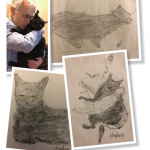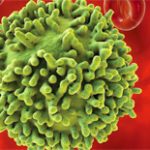“I started working with the LFA as a member of the Medical and Scientific Board in 1991, and from 1995 to 2004 Jenny Palter and I edited Lupus News, which became Lupus magazine.
“In 2001, I was elected to the Board of Directors. It was at that point that I worked closely with Evelyn Hess. From Evelyn, I learned that you can accomplish more through elegant pursuit than through aggressiveness and feistiness—I won’t tell you who was the aggressive one. In 2004, we appointed Sandra [Raymond] to lead LFA. The rest, as they say, is history.
“Max Perutz is my hero. Born in Austria to a rich family (they were in the chemical industry), he studied chemistry and was destined to pick up the family business. In 1936, he decided, to his parents’ chagrin, to pursue a PhD at the Cavendish Laboratory at Cambridge. He elected to reveal the structure of hemoglobin using crystallographic approaches. He stayed absolutely focused, and in 1963, he received the Nobel Prize.
“I want to stress the importance of staying focused, and this is true more for those of us in lupus research. I have tried to imitate Max Perutz and conduct research solely to understand the biochemistry of the lupus immune cells, keeping a deaf ear to the fashion sirens—such as GWAS, microbiome and so on. This award may indicate that I walked the line.
“In 1949, Max Perutz walked away from Bragg’s office (Bragg was the director of the Cavendish lab and a Nobel laureate at the age of 25) absolutely irritated and angry. A month later, he walked back into Bragg’s office with a picture proving 3.6 amino acids per turn in the alpha-helix generating 1.5—a parallel distance.
“Max would write later an autobiographical book, I Wish I Made You Angry Earlier.
“What is my point? I think that we, in lupus research, are docile, expecting a miracle to happen. And I think:
- Shouldn’t we be angry that we refer to lupus as a mystery disease?
- We should be angry that we do not understand its complexity, that we do not have tools for early diagnosis and that we do not have tools to follow disease activity.
- Shouldn’t we be angry that HMOs and insurances companies and hospitals tell us to deal with a myriad of problems each lupus patient has in 20 minutes?
- Shouldn’t we be upset that lupus philanthropy is scarce?
- Shouldn’t we be angry that federal funds for lupus are limited and dwindling?
“I think it is time do something similar to what a few Boston ladies did 250 or so years ago in this port, and they did what they did for a few tax dollars. We have something more serious in our hands—the lives of so many lupus patients.”

